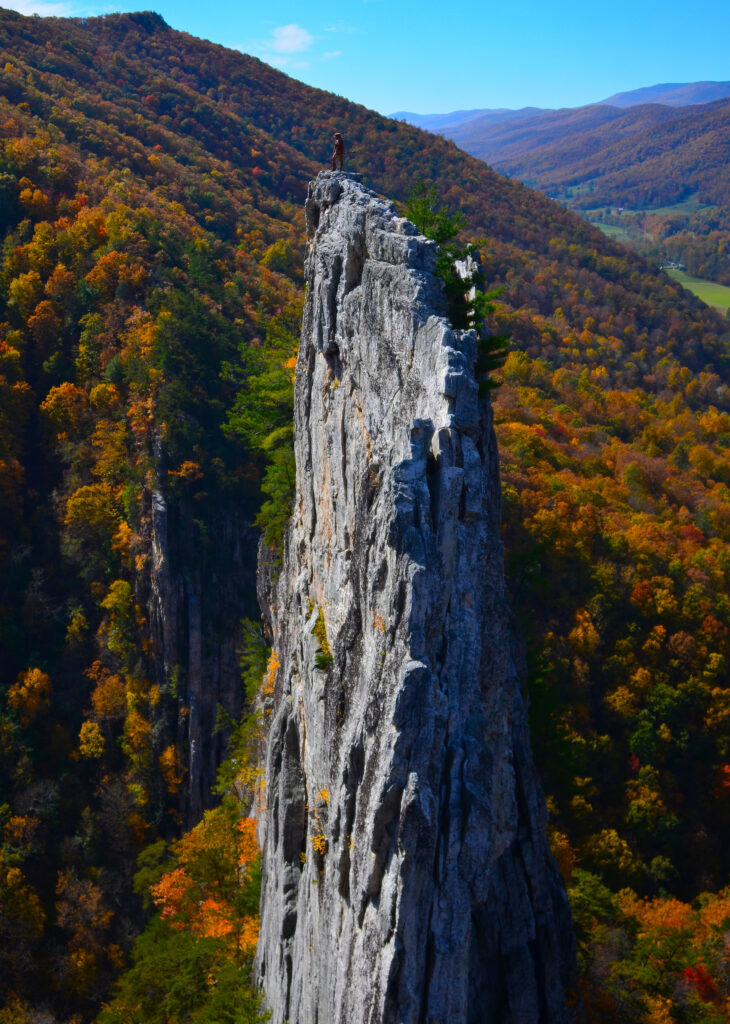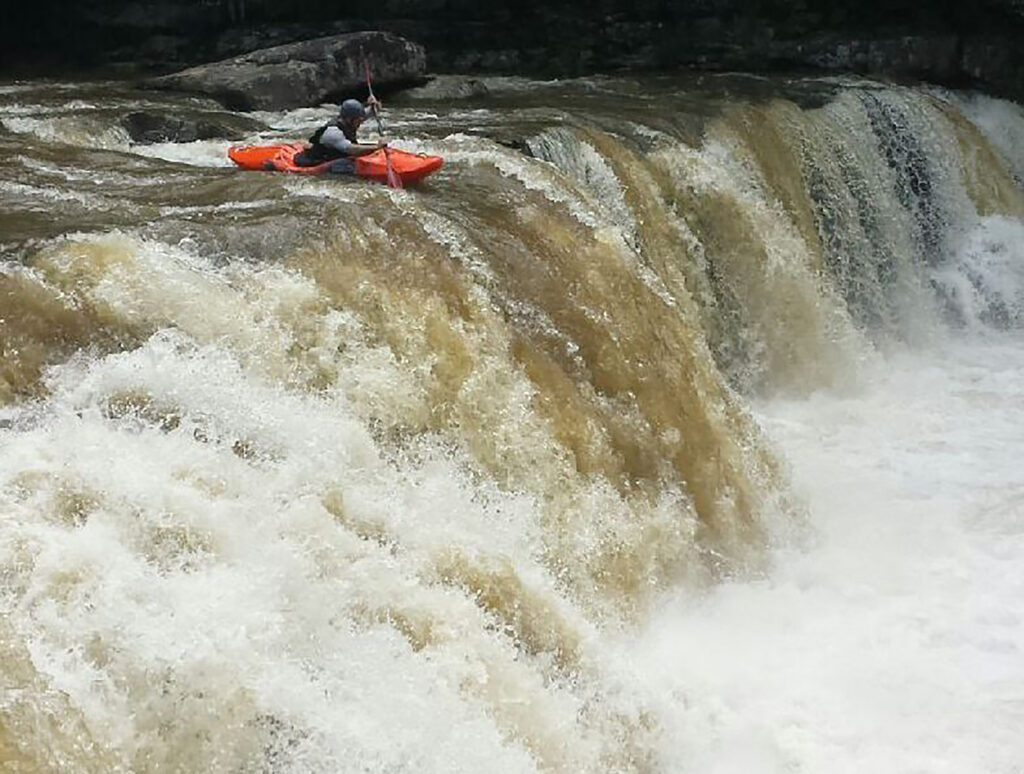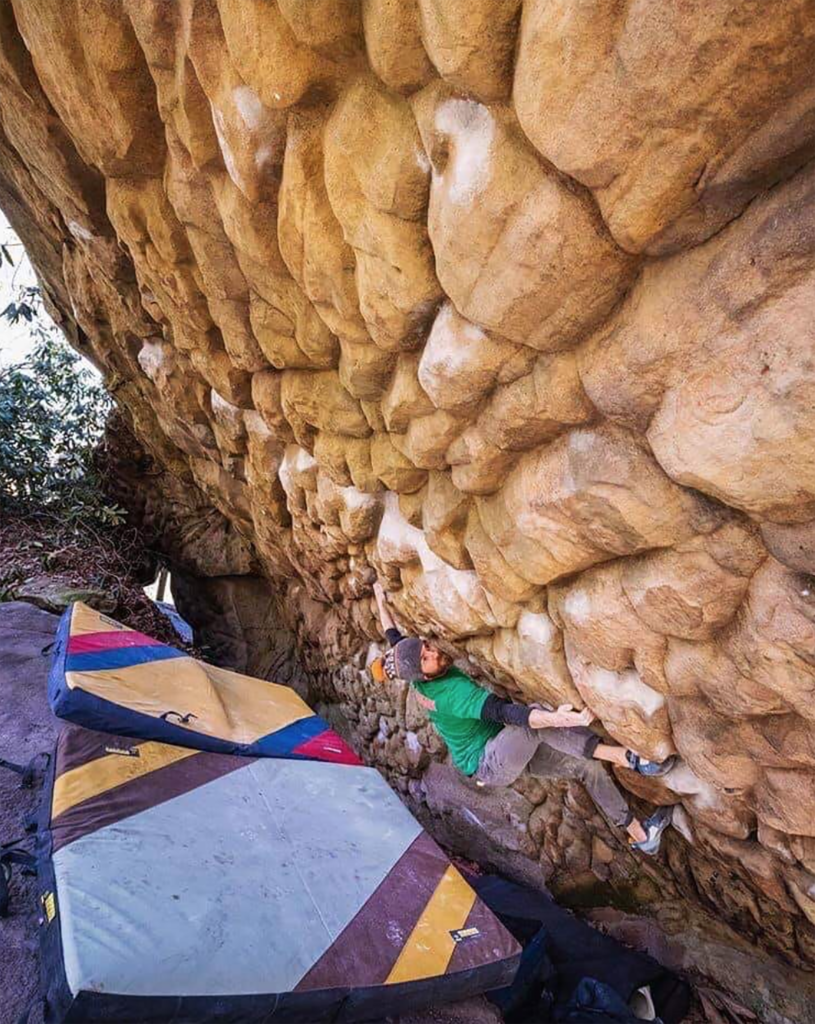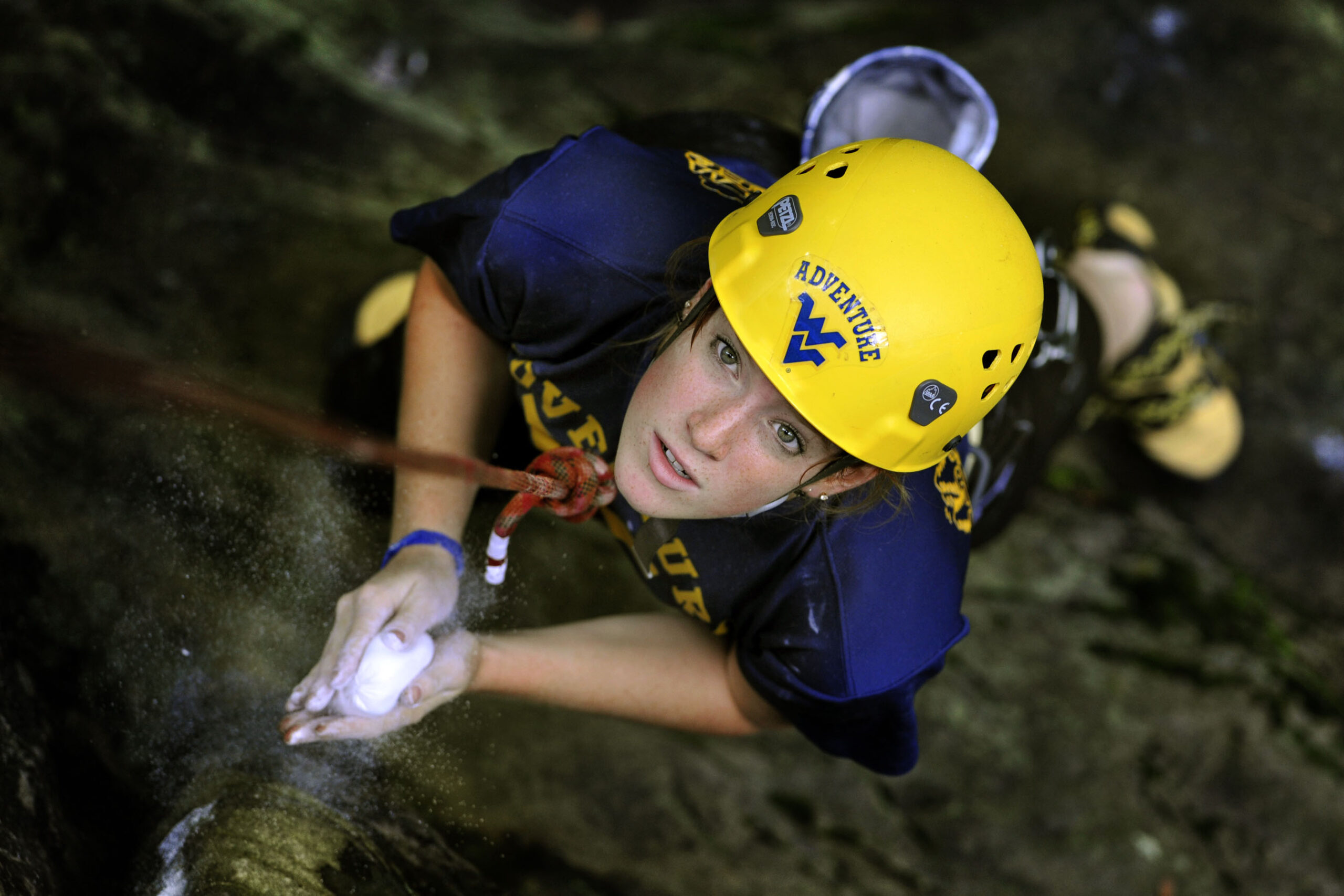MORGANTOWN, W.Va. – Gandalf the Grey gave us plenty of one-liners to mull over, but one sticks out more than others, “The world is not in your books and maps, it is out there.”
Though the rolling hills of the Shire and the Misty Mountains of Middle Earth are indeed in our books, unreachable except for in our imaginations, there are the Roaring Plains of Dolly Sods and the long-stretching Appalachian Mountains to explore here in West Virginia – magical in their own right. These types of journeys are something Adventure WV director Marion Holmes provides every year to WVU students and faculty.
When she’s not doing a day loop at Spruce Knob or leading a backpacking group through Tea Creek, Holmes is the frontwoman in providing a wide range of folks the best outdoor experience in the nation. That’s not anecdote, as Blue Ridge Outdoors awarded WVU as the 2020 Top Adventure College in the large school category on May 2, not just for what Adventure WV brings to the table but also for its degree programs, research and contributions to economic development. Further, world-renowned experimental educator Jennifer Stanchfield said Adventure WV is “on the top of the list,” of outdoor education programs worldwide, and, “I consider it a model program for the field not only because of the fantastic facilities in a beautiful location but also because of the quality holistic programming that has been intentionally and incrementally developed over the years based on community need and ongoing research.”
Holmes was naturally excited.
“It’s good to be recognized for something that you know,” she said. “I don’t mean that to sound like, ‘Yeah we know we’re so great,’ but oftentimes we go under-recognized. Folks always talk about going out west to do cool stuff, but we have so much cool stuff to do here – really local to Morgantown and, really, local to the state. It’s nice to feel that spotlight is pointed at our local resources and how incredible they are. Running Adventure WV, in our small professional community of practice, we’re recognized as a great program and it’s really cool to have that extend to other places.”

Holmes, a native of Massachusetts and graduate of both Harvard and University of New Hampshire, spent most of her life exploring the White Mountains. After going on a trip with Harvard at the age of 18, Holmes became a First-Year Outdoor Program leader with the school. After finishing her undergraduate studies, she moved on to UNH, where she taught backpacking courses in the White Mountains. Since then, she’s moved around the Appalachian Mountain range, taking a job with the Venture program at UNC Charlotte before accepting her current job at WVU in 2013.
“Lots of trees, challenging terrain and rain have always been familiar to me,” Holmes said of her many homes. “It’s all varying degrees of that in different areas, but it’s all gorgeous Appalachia.”
Her experience with multiple outdoor orientation programs made her the perfect fit to lead Adventure WV, and in the last seven years, the program has grown exponentially. Adventure runs between 900 and 1,000 students a year, making it the largest program of its kind in the nation. Because of its ongoing success, the program receives central subsidies from WVU, allowing students to pay either $95 or nothing depending on their financial aid status – a major contribution since outdoor trips cost the university $450 or more per person.
“We like to meet folks where they’re at,” Holmes said.
The brainchild of Greg Corio, assistant vice president of the Outdoor Economic Development Collaborative at WVU and West Virginia native, Adventure WV is not only a stepping stone in showing in-state and out-of-state students the beauty of West Virginia’s outdoor assets, but it’s also a tool that continues to help the university retain them. By connecting students with one another, the school and the Mountain State, it encourages a sense of belonging within participants.
“We’re subsidized well because we do a good job of keeping folks in school,” Holmes said. “We have a lot of evidence that demonstrates retention, but I think that the numbers don’t tell the full truth. Folks are staying in school because they have transformative experiences. At the end of the day, belonging matters and if you don’t feel like you belong somewhere, no matter if it makes financial sense or everything else makes sense, the clock is ticking. I feel we help folks feel a deep sense of belonging to this university and place. Hopefully, for our participants, that’s one of the ways that’s very transformative.”
Corio concurs.
“I have seen the transformative power of getting people out to see West Virginia,” he said. “In watching these [students] who have never traveled to the mountains, to see the beauty and unique assets that West Virginia has to offer, it’s transformative. That can be from faculty and staff to the students – this place is truly amazing.”
Though the founder of Adventure, Corio’s new job revolves around shifting West Virginia’s economic focus from just extractives to also include outdoor recreational assets. The OEDC is taking a look at success in western states and how they’re attracting business, and figuring out how West Virginia can do the same. At the core, it comes down to the quality of life.
“Businesses are moving to places for quality of life because of access to outdoor recreation,” he said. “For example, the Silicon Slopes in Utah. When they interviewed the 50 fastest growing businesses in Utah and why are they there, outdoor recreation came up as the top two reasons. The top reason was that they could steal talent from around the country to work there because of their access to outdoor recreation. The second reason was for the quality of life because the business owners wanted to be someplace that they could ski, climb and bike.
“One of the things we’re looking at is how does Morgantown compare to other towns that are thriving economies? There’s this whole push that younger people are looking for living in places with [a good] quality of life. For instance, within an hour and a half drive from Boise, Idaho, they have 98 miles of whitewater. Boulder, Colo., has 122 miles of whitewater in an hour and a half drive. Morgantown has 605 miles, Beckley has 820, Elkins has 875 and Thomas and Davis have 1,102 miles within an hour and a half drive. Morgantown in a 10-mile radius has over 500 climbing routes. In a 10-mile radius of Asheville, N.C., they don’t have any. West Virginia has the densest whitewater of any state in the country. And as the west becomes drier, West Virginia is becoming wetter. So how do we leverage that as an economic advantage?”
Real potential
When it comes to whitewater, Dr. Nicolas Zegre, associate professor of forest hydrology at WVU, is one of the main people to look to. Not only an authority on hydrology, Zegre has also grown up on water. A lifelong boater and surfer, he’s traveled the world to hit whitewater in his kayaks, but of all the places on the planet he could choose as his favorite, it’s the Big Sandy River that tops the list.

“It’s absolutely beautiful,” Zegre said. “It’s a stunning watershed and river. It has a cool blueish-green hue to it, and has two big waterfalls – Wonder Falls and Big Splat – and is a continuous whitewater. It’s a steep creek that’s close to [Morgantown] and runs more than half of the year. And of course, as a professor and somebody who has a family, to know I can get on world-class whitewater so close to Morgantown and be able to work and raise children it’s pretty amazing.”
Zegre’s first experience with West Virginia waters came after he retired from the U.S. Army and moved to Morgantown for school. Once graduating with a degree in forest resources management in 2000, he moved to Blacksburg, Va., for graduate school and then Corvallis, Ore., for his doctorate. Of all the places he’s lived, the access to water has always been a must. It’s because of that and the experiences he’s had on water that he believes recreation is the future in West Virginia. Further, it’s why he’s involved in Adventure WV and why he wants to change the economic narrative.
“In order for it to be the future, it needs to be accessible and build an ethos of young people interested in protecting the outdoors,” he said. “Adventure WV does all of those. It introduces people that don’t know West Virginia, what it means to be in nature [and] recreate. My involvement with Greg and that program has been on the shared love of the potential for recreation to, really, solve a lot of the problems we have locally to globally.
“A lot of people think science is super inaccessible and abstract, but water is a shared experience and is fundamental for all life [and] the economy. To do hydrological research that directly informs sustainably managing our resources but also developing economically, that’s the goal.”
But there’s a catch: To change the economic model in West Virginia, the state needs to attract and retain young people and businesses. Zegre, Corio and Holmes believe Adventure WV and WVU can lead the way.
“The biggest thing is, first and foremost, providing the opportunity to get out [there],” Zegre said. “Whitewater rivers, caves and climbing – they have their inherent risk. You have to have the knowledge of safety and how to conduct yourself in that environment, so if we don’t take the time to introduce people safely to these resources, then those activities are not accessible. Especially in West Virginia where we have such a deep, rich history of flooding and landslides, there’s a deep, deep fear – and well-founded, fear – in rivers, creeks and caves. Once they experience it, convincing [them to stick with it] isn’t necessary. Rather, they’re awoken to the opportunity. That’s a critical thing that Adventure WV and also the Outdoor Economic Development Collaborative is doing. There’s plenty of young people who would love to stay in West Virginia, but there simply hasn’t been the opportunity to have a career here.
“I’ve seen at it at the undergraduate and graduate [levels]. When people recognize the potential of what West Virginia offers, they want to stay here and figure that out. A lot of my graduate students have moved to West Virginia to go to graduate school and then they’ve discovered what this has and have decided to stay and establish their careers here.”
Academically, WVU offers a recreation, parks and tourism resources degree, and WVU Tech in Beckley offers an adventure recreation management program, which also was recently recognized by Blue Ridge Outdoors as the 2020 best educational outdoor recreation program in the country. Corio has also taken education a step further, overseeing the creation of the Science Adventure School in 2018, a week-long program for 6th-graders at the 10,000-acre Summit Bechtel Reserve in Glen Jean.
“It’s a build off of our Adventure WV model and is an outdoor orientation program tying in science lessons and building the confidence for the kids. It’s truly amazing.”

Further, Adventure WV trains students to take the lead on trips which builds skills that will translate over to the professional outdoor recreation field.
“When you have those connections [to the state], you’re more than likely to stick around,” Holmes said. “Some will and do need to travel to other places in order to get work experience, but they also know first hand how great it is to work in this state. Outdoor recreation is a great part of our economy and a great field to work in.”
From an economic standpoint, though, it goes without saying that many blue-collar West Virginians become concerned when another industry starts to gain traction and threatens their job, whether that be coal mining or natural gas extraction. However, Zegre notes that outdoor recreation can, and should, exist alongside the extractive industry.
“One thing that’s important to stress is an outdoor recreation economy isn’t this or that, and that’s something we hear a lot about,” he said. “We have a deep cultural tie to natural resource extraction, and for much of our recent times we have this, ‘It’s either coal or gas or outdoor recreation.’ I think what we see in mountainous states and vibrant states with vibrant economies, what makes them vibrant is the diversity across different economic opportunities. I think it’s really important here in West Virginia that the conversation is trained to, ‘It’s this and that,’ not, ‘This or that.’
“We can do it all. We just have to be deliberate and proactive about how to do that, and not just assume one way is the right way.”
TWEET @ASpellman_DPost




